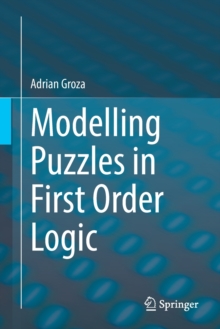Description
| Product ID: | 9783030625467 |
| Product Form: | Paperback / softback |
| Country of Manufacture: | GB |
| Title: | Modelling Puzzles in First Order Logic |
| Authors: | Author: Adrian Groza |
| Page Count: | 338 |
| Subjects: | Educational equipment and technology, computer-aided learning (CAL), Educational equipment & technology, computer-aided learning (CAL), Mathematical foundations, Mathematical logic, Mathematical theory of computation, Artificial intelligence, Mathematical foundations, Mathematical logic, Mathematical theory of computation, Artificial intelligence |
| Description: | Select Guide Rating Keeping students involved and actively learning is challenging. Instructors in computer science are aware of the cognitive value of modelling puzzles and often use logical puzzles as an efficient pedagogical instrument to engage students and develop problem-solving skills. This unique book is a comprehensive resource that offers teachers and students fun activities to teach and learn logic. It provides new, complete, and running formalisation in Propositional and First Order Logic for over 130 logical puzzles, including Sudoku-like puzzles, zebra-like puzzles, island of truth, lady and tigers, grid puzzles, strange numbers, or self-reference puzzles. Solving puzzles with theorem provers can be an effective cognitive incentive to motivate students to learn logic. They will find a ready-to-use format which illustrates how to model each puzzle, provides running implementations, and explains each solution. This concise and easy-to-follow textbook is a much-needed support tool for students willing to explore beyond the introductory level of learning logic and lecturers looking for examples to heighten student engagement in their computer science courses. Keeping students involved and actively learning is challenging. Instructors in computer science are aware of the cognitive value of modelling puzzles and often use logical puzzles as an efficient pedagogical instrument to engage students and develop problem-solving skills. This unique book is a comprehensive resource that offers teachers and students fun activities to teach and learn logic. It provides new, complete, and running formalisation in Propositional and First Order Logic for over 130 logical puzzles, including Sudoku-like puzzles, zebra-like puzzles, island of truth, lady and tigers, grid puzzles, strange numbers, or self-reference puzzles. Solving puzzles with theorem provers can be an effective cognitive incentive to motivate students to learn logic. They will find a ready-to-use format which illustrates how to model each puzzle, provides running implementations, and explains each solution.This concise and easy-to-follow textbook is a much-needed support tool for students willing to explore beyond the introductory level of learning logic and lecturers looking for examples to heighten student engagement in their computer science courses.
|
| Imprint Name: | Springer Nature Switzerland AG |
| Publisher Name: | Springer Nature Switzerland AG |
| Country of Publication: | GB |
| Publishing Date: | 2021-10-27 |


